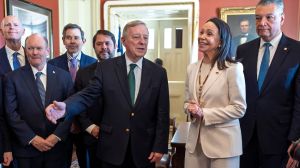New Fed on the Block
Ben Bernanke has been named successor to Alan Greenspan, the Chairman of the Federal Reserve Bank of the US. It is expected that he will fav...

Ben Bernanke has been named successor to Alan Greenspan, the Chairman of the Federal Reserve Bank of the US. It is expected that he will favour 8220;rules rather than discretion8221; in running America8217;s and through it a large part of the world8217;s monetary policy. What does this mean for India?
8226; What is meant by 8220;rules rather than discretion8221;?
Economists now believe that if a central bank has 8220;discretion8221;, i.e it chooses its next step based not on clear objectives and clearly defined methods to achieve those objectives, but on some notions that it holds close to its heart, this will lead to inferior economic outcomes. Everybody is better off if the central bank binds it8217;s own hands 8211; in the public eye 8211; by working within rules.
8226; What kinds of rules can be written?
The most important rule for a central bank, which has gained ground worldwide, is called 8220;inflation targeting8221;. In this, the central bank commits itself to a numerical target for inflation in the long run. This is generally accompanied by a tremendous transparency in how monetary policy is conducted.
8226; Why do central banks need to be transparent?
The most important way in which monetary policy operates, in the modern world, with well developed financial markets, is by shaping the expectations of financial players. If a central banklies or speaks in mumbo jumbo, then participants in financial markets do not know what is coming next. The Bank of England is seen as a role model in how this should be organised.
8226; How does the Bank of England work?
The UK ministry of finance writes a letter to the Bank of England telling them what inflation rate should be targeted. The typical value has been 2.25. The Bank of England has a monetary policy committee, which includes outsiders. They periodically vote on whether rates should be raised or lowered and the decision is by simple majority. The voting record is made public, as is a rationale statement by each person on why he voted the way he did. These rationale statements serve to bring transparency to the process.
Economists strongly believe that the interest-rate setting of central banks should be immune to the election cycle. This motivates independence of the central bank. But this needs to simultaneously be accompanied by accountability, otherwise central banks have arbitrary power without accountability. Inflation targeting, and bonuses for central bankers based on their hitting agreed-upon targets, are the way for a central bank to be held accountable.
8226; Where does Ben Bernanke stand on these questions?
Ben Bernanke has long favoured inflation targeting, more transparency and explicit, publicly stated rules. Greenspan used to communicate very effectively, in his own way, and Greenspan8217;s monetary policy is widely viewed as having been well run. But a modern country cannot rely on one person. Bernanke8217;s positions are in favour of explicit rules, and greater transparency, so that US monetary policy is trusted at an institutional level, regardless of individuals. We can expect the US Federal Reserve to talk more openly about what it is thinking. We may also get institutional change in the US Fed to take it closer to the UK model.
8226; Let8217;s turn to India now. How does monetary policy work in India?
In India the RBI does not have a specific inflation target. While it would be ideal for the RBI to have such a target, today the RBI is burdened with conflicting objectives such as exchange rate targeting, managing the government debt and regulating banks. This makes it difficult for the RBI to follow a single goal, as is being done in advanced countries. Monetary policy in industrial countries, in the last 20 years, has been a great success, in response to simplifying the mandate and having clear accountability. This has given lower inflation, stable inflation, stable interest rates, and stable GDP growth.
As an example, if there is pressure on the rupee to appreciate, if the RBI8217;s objective function had been to target inflation, it would have allowed the rupee to appreciate making imports cheaper and keeping inflation down. So despite sharply rising dollar prices of oil, India could have seen a somewhat slower increase in the rupee price of oil. However, the RBI, which also tries to manage the rupee, prevented the rupee from appreciating to help India8217;s exporters, and in the process allowed inflation to move up.
8226; What is the importance of 8220;rules vs discretion8221; in a democracy?
In a democracy, every arm of government must be open and transparent, with bonuses linked to achieving stated goals, so as to ensure that it works for the interests of the people. Non-transparency by any government agency has been a tool for concealment of incompetence and theft. We need to debate whether it is more important to keep inflation down or to help exporters. This is a zero sum game where one8217;s gain is another8217;s loss. So, for example, when you keep the rupee weak, you transfer resources from the general consumer who has a significant import content in her consumption basket such as oil to exporters who can make higher profits because of the weaker rupee. The decision to do this must be public. Discretion prevents that from happening.
8226; If the world is moving towards central banks run on rules why should it matter for India?
One obvious reason is that when 20 major countries in the world are benefitting from better structuring and running central banks, why should we have to suffer from antiquated arrangements? But at a more pragmatic level, this aspect is triply important in a developing country with foreign capital in the picture. If foreign capital trusts and respects the central bank, then foreign capital in the country will be more stable.
8226; So what should India do?
Many decades ago, central banks said that they would lean against the wind, that we should trust them, and that was enough. Today, it is important to define what you mean by the word wind, define how wind is measured, and tell how you will respond to what kinds of wind in the future.
- 01
- 02
- 03
- 04
- 05































